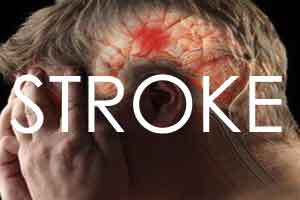- Home
- Editorial
- News
- Practice Guidelines
- Anesthesiology Guidelines
- Cancer Guidelines
- Cardiac Sciences Guidelines
- Critical Care Guidelines
- Dentistry Guidelines
- Dermatology Guidelines
- Diabetes and Endo Guidelines
- Diagnostics Guidelines
- ENT Guidelines
- Featured Practice Guidelines
- Gastroenterology Guidelines
- Geriatrics Guidelines
- Medicine Guidelines
- Nephrology Guidelines
- Neurosciences Guidelines
- Obs and Gynae Guidelines
- Ophthalmology Guidelines
- Orthopaedics Guidelines
- Paediatrics Guidelines
- Psychiatry Guidelines
- Pulmonology Guidelines
- Radiology Guidelines
- Surgery Guidelines
- Urology Guidelines
Stroke risk after heart attack persists for months : Study

The risk for a stroke is elevated longer than previously believed after a heart attack, according to the findings of a study presented at a meeting of the American Neurological Association, in Atlanta.
"A heart attack is a risk factor for stroke for at least three months," said researcher Dr. Alexander Merkler, an assistant professor of neurology at Weill Cornell Medical College in New York City.
"That's big news because all the data we have so far suggests that heart attack is only a risk factor for stroke for one month," he said.
Read Also: Simple test may predict prognosis of stroke
The researchers analyzed the data of more than 1.7 million Medicare patients, of whom more than 46,000 were hospitalized for a heart attack and 80,000 for a stroke. The researchers found a higher risk for stroke among patients who had had a heart attack compared with patients who didn't suffer a heart attack.
"These findings will change the way we think of the relationship between heart attack and stroke," said Merkler.
The greatest risk was in the first month after heart attack patients left the hospital, Merkler said. "But the risk remained high during the five to 12 weeks after discharge. After 12 weeks, the risk appeared to return to pre-heart attack levels," he added.
Read Also: Walking just 35 minutes a day protects from stroke
Dr. Gregg Fonarow, a cardiologist at the University of California, Los Angeles, said earlier studies have shown that after a heart attack, both men and women are at greater risk for a stroke.But, the time when the risk is greatest has not been certain, said Fonarow, who also directs the Ahmanson-UCLA Cardiomyopathy Center.
This new study finds the greatest risk of stroke is during the first four weeks after hospital discharge, but it persists for 12 weeks regardless of the type of heart attack, he said.
"It isn't clear why a heart attack increases stroke risk, Merkler said. It might be that damage to the heart causes clots that can travel to the brain," he said.
Current practice is to have patients take antiplatelet drugs, such as aspirin, after a heart attack. But these new findings suggest that patients might need blood thinners to prevent clots, Merkler said. More studies are needed to see which works best, he added.

Disclaimer: This site is primarily intended for healthcare professionals. Any content/information on this website does not replace the advice of medical and/or health professionals and should not be construed as medical/diagnostic advice/endorsement or prescription. Use of this site is subject to our terms of use, privacy policy, advertisement policy. © 2020 Minerva Medical Treatment Pvt Ltd